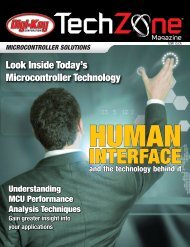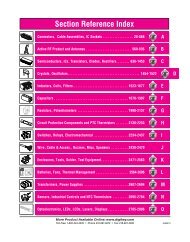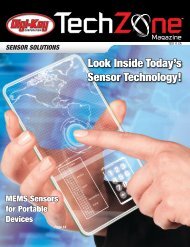Microcontroller Solutions TechZone Magazine, April 2011 - Digikey
Microcontroller Solutions TechZone Magazine, April 2011 - Digikey
Microcontroller Solutions TechZone Magazine, April 2011 - Digikey
You also want an ePaper? Increase the reach of your titles
YUMPU automatically turns print PDFs into web optimized ePapers that Google loves.
The Ultra-Low-Power<br />
USB Revolution<br />
by Bhargavi Nisarga, Keith Quiring, and Les Taylor, Texas Instruments<br />
New MCUs bring power efficiency and<br />
simplicity to USB for portable embedded<br />
applications.<br />
The ubiquity of USB makes it an extremely attractive interface for<br />
applications requiring connectivity to a PC or other host device for<br />
configuration, periodic downloading of data, or firmware updates.<br />
Often these devices are portable, such as medical or industrial tools<br />
which remotely collect data that needs to be uploaded at a later time.<br />
As these devices are portable, the final USB implementation must be<br />
both cost-effective and power efficient.<br />
One of the main reasons for USB’s success is its unparalleled ease<br />
of use. But under the surface, USB is a complicated technology that<br />
artfully masks the user from the complexity. As a result, developers<br />
new to USB often underestimate the effort involved. Many new terms<br />
and procedures are also encountered, and things often do not “just<br />
work” the way they should.<br />
Hidden challenges may result in unexpected delays for the developer,<br />
and delays are expensive.<br />
To developers trying to focus on differentiating their products and<br />
offering the best value to their customers, these challenges are an<br />
unwelcome burden. For this reason, TI has committed to delivering<br />
USB technology as an integrated, simplified solution that enables<br />
developers to focus on using USB in their application rather than<br />
learning USB as a technology.<br />
Introducing the MSP430TM USB microcontroller<br />
To meet the needs of developers, TI has introduced full-speed USB to<br />
the F5xx series of MSP430 microcontrollers (MCU). By integrating USB<br />
with powerful performance (up to 25 MHz), large memory (both Flash<br />
and RAM), integrated intelligent peripherals (including an on-chip<br />
ADC, comparator, hardware multiplier, DMA controller, temperature<br />
sensor and other peripherals), and superior power management,<br />
the MSP430 is the ideal MCU for implementing USB in embedded<br />
applications (see Figure 1).<br />
With the simple addition of a USB connector and a few discretes,<br />
MSP430 USB MCUs are a complete solution for applications that<br />
require USB connectivity and analog peripherals, while being<br />
ultra-low-power. From a software standpoint, TI provides API stacks<br />
supporting three of the most common device classes.<br />
Figure 1: Integrating USB with the powerful performance and high integration of<br />
the MSP430 architecture creates the ideal microcontroller for implementing USB in<br />
embedded applications.<br />
The new MSP430 USB MCUs are based on TI’s newest and most<br />
advanced MSP430 architecture, the F5xx. Each supports 1.8 to<br />
3.6 V operation, with clock speeds up to 25 MHz and integrated,<br />
programmable power supervision on the order of 200 nA. New clock<br />
sources further maximize tradeoffs between power, speed, precision<br />
and cost. Flash writes/erases can be performed across the full range<br />
of Vcc. In addition to offering a wide range of flash memory sizes (64<br />
to 128 KB and 16 to 256 KB), USB-enabled MSP430 devices also have<br />
2 KB RAM dedicated to USB that, when USB is disabled, is available<br />
for general purpose use.<br />
Accelerated development and ease of use<br />
TI recognizes that consumers – and engineers – have come to<br />
expect that USB “just works.” In truth, while USB looks as simple<br />
as a UART or SPI port, the protocol is not trivial to implement.<br />
And unlike the UART or SPI interfaces, compliance is a primary<br />
USB design consideration, even in the simplest applications. For<br />
example, a host can suspend an attached device at any time.<br />
Devices must also be able to handle “surprise removals.” For<br />
developers who have not been through this process before, such<br />
unexpected considerations can require extra development time and<br />
lead to unexpected delays.<br />
Part of the value-add of the MSP430’s USB support is that much<br />
of the underlying complexity of implementing USB is managed<br />
through an intuitive API stack. The API stacks are designed for fast<br />
absorption by the developer. Like USB itself, they contain much<br />
of the complexity “under the hood,” masking the developer from<br />
unnecessary hassle to help speed development time. The stack<br />
www.digikey.ca/microcontroller<br />
7














